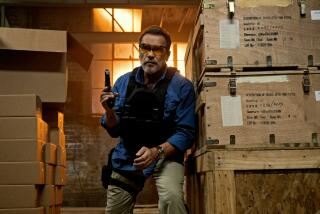The Good Fight
- Share via
“Billy Port’s ride” to rescue U.S. Marines stranded in China in World War II is a legend, James Brady says, told and retold whenever old “Chinaside” veterans gather. But official documentation is scarce, leaving Brady ample room to embroider the legend in his novel, “Warning of War.”
Days before Pearl Harbor, Brady says, a warning that war might soon break out with Japan was sent to U.S. troops overseas, including the 1,008 men of the 4th Marine Regiment, “in their forest-green uniforms, their canvas leggings, with their Springfield rifles and tin hats,” who had been stationed in China since the Boxer Rebellion.
Much of China by that time was occupied by a million Japanese soldiers, so the Marines planned a hasty exit. Garrisons in port cities would embark by ship to the Philippines (and soon be engulfed in the fighting for Bataan and Corregidor). But smaller contingents were scattered inland from Peking to the edge of the Gobi Desert. According to the legend, Capt. Billy Port was sent with a few selected men and four trucks to get them out any way he could.
In Peking, a by-the-book commander preferred to wait for orders to proceed to the coast for transport. He and his men were forced to surrender only hours after Port slipped out of the city, en route to the Great Wall, the Gobi and the wastes of Manchuria and Siberia, pursued by an elite Japanese force led by the embittered American-born Col. Jesse Irabu.
Accompanying Port, for various reasons, were an English Jesuit paleontologist, a French race-car driver, a Chinese doctor and a White Russian prince bent on helping his old enemies, the Reds, to resist Hitler. All come in handy in Brady’s reconstruction of their journey through a 500-mile obstacle course of bandits, warlords, blizzards, epidemics and occasional strafing from the air.
Port, it seems, was no ordinary Marine captain. He was rich: heir to a Boston bootlegging fortune that rivaled the Kennedys’, he lived in a mansion in Shanghai with servants and a 19-year-old Russian mistress; he drove a Bentley and, in Brady’s account, takes that luxury car along on the rescue mission.
Brady (“The Marines of Autumn,” “The Coldest War”) clearly views the U.S. Marine Corps as the noblest and most puissant body of men since the Table Round--an attitude that will endear him to some readers and grate on others. The sketchy historical record (an annoying feature of “Warning of War” is the extent of the doubtful area between what’s obviously true and what’s obviously made up) is an armature on which Brady sculpts an image of an ideal Marine, a born leader who may chafe at peacetime regulations but is “a virtuoso” at fighting.
Brady quotes Gen. Lewis B. “Chesty” Puller, Port’s commander when Marines were sent to quell the Sandino revolt in Nicaragua from 1927 to 1933: “I’d as soon go to war with Billy Port as any man I know. Marines will follow him anywhere. An officer either has command or he doesn’t. Billy has it. And besides that, he knows how to kill a fellow and has the stomach to do so.”
That those Nicaraguans might have had a reason to revolt--or that the Marines’ job was to train a National Guard that would keep the Somoza dictatorship in power for decades to come--seems not to have crossed Port’s mind. He’s a man of action, aware that too much introspection would blunt his edge; and he’s a professional among other professionals in a pre-draft era.
As “Black Hawk Down” reminded us, the range of personalities in America’s post-draft military--from lifer to seriously gung-ho--is much narrower than the range portrayed in war novels from “The Naked and the Dead” through “Catch-22” to “The Things They Carried,” in which many characters were civilians only temporarily in uniform who kept their civilian viewpoints.
In “Warning of War,” the civilians are, literally, just along for the ride. Port kills with relish in combat scenes that display Brady’s descriptive power and knowledge of period weapons and tactics. Only toward the end does Port reveal a deeper humanity. He’s bothered by the collateral damage his mission causes, including children and Mongol ponies machine-gunned by a Zero fighter plane. He confides to the Jesuit: “Like the lepers of Molokai, everything I touch dies.”
The Jesuit, it seems, existed but, repatriated to England, he was killed by a buzz bomb in 1944. Port’s confession, then, may be imaginary, but Brady uses it to explain a final self-sacrificial act of heroism: In Siberia, Port left his unit to serve as defense counsel for the Russian prince, who had been arrested by Stalin’s secret police, and vanished himself--into the gulag and probable death and into legend.
More to Read
Sign up for Essential California
The most important California stories and recommendations in your inbox every morning.
You may occasionally receive promotional content from the Los Angeles Times.










